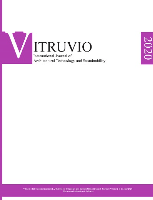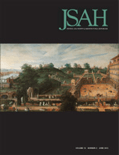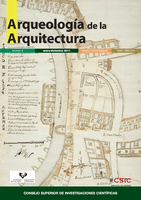
EGE-Revista de Expresion Grafica en la Edificacion
Scope & Guideline
Fostering collaboration in graphic expression for architecture.
Introduction
Aims and Scopes
- Architectural Representation and Documentation:
The journal highlights methodologies for representing architecture, including traditional techniques and modern digital tools, emphasizing their role in documentation and analysis. - Cultural Heritage and Restoration:
A significant focus on the conservation and restoration of architectural heritage, exploring both theoretical and practical approaches to preserving historical sites. - Urban Planning and Design:
The journal addresses the application of graphic expression in urban planning, examining how architectural drawing informs decision-making processes in urban environments. - Interdisciplinary Approaches to Architecture:
It promotes interdisciplinary research that combines architecture with technology, art, and social sciences, fostering a comprehensive understanding of built environments. - Sustainability and Territorial Studies:
The journal incorporates themes of sustainability in architecture and urban planning, addressing the relevance of graphic expression in promoting sustainable practices. - Historical Analysis and Architectural Critique:
It includes studies on the history of architecture and urban design, providing critical insights into past architectural practices and their implications for contemporary design.
Trending and Emerging
- Digital Technologies in Architecture:
There is a growing emphasis on the application of digital technologies, such as 3D modeling, HBIM, and augmented reality, in architectural documentation and design, reflecting the industry's shift towards digital methodologies. - Community Engagement and Participatory Design:
Recent publications increasingly explore community participation in architectural projects and heritage restoration, highlighting the importance of stakeholder involvement in the design process. - Sustainable Architecture Practices:
A significant trend towards sustainability is evident, with research focusing on sustainable materials, energy-efficient design, and the integration of ecological principles in architectural practices. - Interdisciplinary Collaboration:
The journal is witnessing an increase in studies that integrate insights from various disciplines, including sociology, cultural studies, and environmental science, to enrich architectural discourse. - Crisis and Resilience in Architecture:
Emerging themes related to crisis response in architecture, including adaptations to climate change and urban resilience, indicate a shift towards addressing pressing global challenges through architectural solutions.
Declining or Waning
- Purely Theoretical Studies:
There appears to be a waning interest in purely theoretical explorations of architecture without practical applications. Recent publications favor empirical studies and methodologies that incorporate real-world applications. - Traditional Architectural Styles:
The focus on traditional architectural styles and their representation has decreased, possibly in favor of more contemporary and innovative architectural practices that address modern challenges. - Generalized Urban Studies:
There is a noticeable decline in general urban studies that do not incorporate graphic methodologies or specific case studies, as the journal increasingly favors targeted analyses with clear methodological frameworks. - Conventional Survey Methods:
The use of conventional survey methods in architectural studies has diminished, with a shift towards more advanced digital surveying techniques and technologies. - Art Historical Analysis:
Themes related to art historical analysis within the context of architecture are becoming less frequent, as the journal increasingly focuses on practical applications of graphic expression in architecture.
Similar Journals

Disegnare Idee Immagini-Ideas Images
Unveiling the Artistry Behind Architectural InnovationDisegnare Idee Immagini-Ideas Images is a distinguished academic journal published by GANGEMI EDITORE SPA, specializing in the fields of Architecture, Visual Arts, and Performing Arts. With an ISSN of 1123-9247, this journal serves as a vital platform for the dissemination of innovative ideas and research findings in these dynamic disciplines. Over its publication span from 2009 to 2023, it has established itself in the academic community, achieving a respectable ranking in the third quartile for Architecture and second quartile for Visual Arts and Performing Arts as of 2023. Although not an Open Access journal, it offers rich content that appeals to researchers, professionals, and students alike, fostering collaboration and dialogue among scholars in Italy and beyond. The journal is an invaluable resource for those looking to explore the intersections of design and artistic expression.

VITRUVIO-International Journal of Architectural Technology and Sustainability
Connecting researchers and practitioners for a greener future.Welcome to the VITRUVIO-International Journal of Architectural Technology and Sustainability, a leading open-access journal published by UNIV POLITECNICA VALENCIA, EDITORIAL UPV since 2015 and based in Spain. With its ISSN 2444-9091, this journal is dedicated to advancing the field of architectural technology and sustainability, providing a vital platform for researchers, professionals, and students alike. The journal has made significant strides in the academic landscape, achieving a Q3 ranking in Architecture and a Q4 ranking in Building and Construction for 2023. It features a diverse range of scholarly articles that explore innovative practices, cutting-edge research, and sustainable solutions in architecture. With a Scopus ranking placing it at #70/189 in Architecture and #161/223 in Building and Construction, it is positioned within the 63rd percentile and 28th percentile respectively, demonstrating its increasing impact in these vital fields. We invite you to engage with our content and contribute to the ongoing discourse around sustainability in architectural practice.

JOURNAL OF THE SOCIETY OF ARCHITECTURAL HISTORIANS
Championing Interdisciplinary Perspectives in ArchitectureJOURNAL OF THE SOCIETY OF ARCHITECTURAL HISTORIANS, published by the SOCIETY OF ARCHITECTURAL HISTORIANS, serves as a premier platform for the dissemination of scholarly research and critical discourse in the fields of architecture and architectural history. Established in 1970, this journal has undergone significant evolution, focusing on interdisciplinary studies that explore architectural heritage, theory, and practice. With a current impact factor that places it within the Q2 category in both History and Visual Arts and Performing Arts, as well as Q3 in Architecture, the journal maintains a robust reputation among academics and professionals alike. Although it operates under traditional access models, its essential role in fostering a deep understanding of architectural narratives and their socio-cultural contexts remains unparalleled. The journal also ranks favorably in Scopus, highlighting its importance in the arts and humanities, as well as engineering disciplines related to architecture. By bridging the gap between historical inquiry and contemporary architectural criticism, the JOURNAL OF THE SOCIETY OF ARCHITECTURAL HISTORIANS continues to be a vital resource for researchers, professionals, and students endeavoring to enrich their knowledge and contribute to this dynamic field.

ArcHistoR-Architecture History Restoration
Fostering Global Dialogue in Architectural RestorationArcHistoR-Architecture History Restoration is an esteemed open-access journal published by UNIV MEDITERRANEA REGGIO CALABRIA since 2014, focused on the multifaceted domains of architecture, history, and visual arts. This journal serves as a vital platform for the dissemination of research findings, innovative methodologies, and critical discussions surrounding the restoration and history of architectural practices, appealing to a diverse audience of researchers, professionals, and students in these fields. With a commitment to scholarly excellence, ArcHistoR has positioned itself within the academic community, reflected in its ranking in the 2023 category quartiles, where it secured Q4 in Architecture and Q3 in both History and Visual Arts and Performing Arts. The journal facilitates global collaboration and knowledge sharing in its areas of expertise, further underscoring its relevance and significance. Based in Italy, effective communication and cooperation in the restoration community can flourish through the journal's purview. For those dedicated to expanding their understanding and contributing to the discourse on architectural history and restoration, ArcHistoR is an invaluable resource.

Cuaderno de Notas
Unveiling New Perspectives in Creative ScholarshipCuaderno de Notas is a dedicated journal that serves as a platform for scholarly discourse within the realm of arts and humanities, published by UNIV POLITECNICA MADRID, ESCUELA TEC SUP ARQUIT, DEPT COMPOSICION ARQUITECT. With an ISSN of 1138-1590 and an E-ISSN of 2386-8376, this open-access journal has been committed to free dissemination of knowledge since 2009. As of 2023, it holds a Q4 ranking in the arts and humanities category, reflecting its emerging presence in the academic community with a Scopus rank of #483/552 and a 12th percentile standing. Cuaderno de Notas aims to foster interdisciplinary research and creative expression, making it an essential resource for researchers, artists, and students seeking to engage with contemporary issues in the arts and humanities. Its base in Madrid, Spain, positions the journal at the cultural crossroad of European and global artistic innovation, ensuring its contributions are both timely and relevant.

Bulletin KNOB
Bridging Heritage and InnovationBulletin KNOB, published by the KONINKLIJKE NEDERLANDSE OUDHEIDKUNDIGE BOND-KNOB, is a reputable Open Access journal that has been disseminating knowledge since 1899, with a continued commitment to making research accessible to all. Based in the Netherlands, this journal provides a platform for scholarly articles that span the fields of Conservation, History, and the Visual Arts and Performing Arts. With its 2023 Scopus rankings placing it in the top quartiles within its category, Bulletin KNOB is recognized for its significant contribution to the advancement of these disciplines. Researchers, professionals, and students alike are encouraged to engage with the journal's diverse content that bridges historical narratives with contemporary practices, fostering a deeper understanding of cultural heritage. The journal’s commitment to excellence is further reflected in its Q3 and Q4 quartile rankings, making it an essential resource for anyone dedicated to the study of the arts and humanities.

Arqueologia de la Arquitectura
Connecting Archaeology with Architectural ExcellenceArqueologia de la Arquitectura is a premier scholarly journal published by CONSEJO SUPERIOR INVESTIGACIONES CIENTIFICAS-CSIC, specializing in the intricate intersections of architecture, archaeology, and conservation. Since its inception in 2002, this Open Access journal has provided researchers, professionals, and students with a platform to share innovative findings that deepen our understanding of architectural heritage and its archaeological contexts. Based in Spain, it has demonstrated remarkable academic rigor and impact, achieving Q1 rankings in multiple categories, including Architecture and Visual Arts and Performing Arts, alongside a Q2 in Archaeology as of 2023. With a robust presence in Scopus, ranking within the 88th percentile for Visual Arts and Performing Arts, Arqueologia de la Arquitectura stands as a crucial resource for those dedicated to the preservation and study of our built heritage, encouraging interdisciplinary dialogue and research advancements in these elegant fields of study.

En Blanco-Revista de Arquitectura
Bridging Ideas and Innovation in Architectural DiscourseEn Blanco - Revista de Arquitectura is a peer-reviewed journal published by UNIV POLITECNICA VALENCIA, EDITORIAL UPV, specializing in the field of architecture and design. This esteemed publication aims to bridge theoretical advances and practical applications within the architecture domain, showcasing innovative research, critical essays, and multidisciplinary approaches. With an emphasis on fostering dialogue among researchers, professionals, and students, En Blanco serves as an essential platform for disseminating cutting-edge ideas and discussions that define contemporary architectural practices. Although currently offering non-open access content, the journal is dedicated to promoting accessibility through insights that resonate beyond its pages. With an ISSN of 1888-5616 and E-ISSN of 2445-1215, En Blanco is a pivotal resource for any architecture enthusiast looking to enrich their understanding and contribute to the evolving discourse in architectural studies.

Architektura & Urbanizmus
Exploring Innovative Solutions for Modern Urban ChallengesArchitektura & Urbanizmus is a distinguished scholarly journal published by the Institute of History at the Slovak Academy of Sciences, with a specific focus on the fields of architecture, conservation, and urban studies. Since its transition to Open Access in 2021, the journal aims to broaden the accessibility of vital research findings to a global audience, fostering knowledge-sharing and collaboration among scholars, practitioners, and students alike. The journal has consistently contributed to the academic discourse since its inception and now spans converged years from 2007 to 2023, adapting to the evolving landscape of its disciplines. With its categorization in Q3 for both Architecture and Conservation, and Q4 in Urban Studies for 2023, it stands as a credible platform for disseminating innovative research and practical insights. The journal's current Scopus rankings reflect its growing influence in the field, offering a significant opportunity for researchers to contribute original work that addresses contemporary challenges in architecture and urban development. Situated in the heart of Bratislava, Slovakia, at Klemensova 19, Architektura & Urbanizmus invites contributions that enrich the architectural heritage and environmental integrity of urban spaces.

Ra-Revista de Arquitectura
Challenging conventions, inspiring creativity.Ra-Revista de Arquitectura is an esteemed open-access journal published by UNIV NAVARRA, SERVICIO PUBLICACIONES in Spain, dedicated to the fields of architecture and the visual arts. With an ISSN of 1138-5596 and an E-ISSN of 2254-6332, this journal aims to foster a critical dialogue among scholars, practitioners, and students by offering original research, reviews, and case studies that challenge conventional architectural paradigms and inspire innovation. Since transitioning to an open-access model in 2012, Ra has expanded its reach, allowing free access to knowledge that resonates within both academic and professional communities. Although the journal is currently ranked in Q4 in its respective categories, it remains a vital platform for emerging voices and advancements in the architecture and visual arts disciplines. Researchers can find valuable insights that push the boundaries of both theory and practice. The journal is part of a vibrant academic tradition, contributing to a deeply reflective cultural heritage, and it invites contributors from diverse backgrounds to submit their works for consideration.